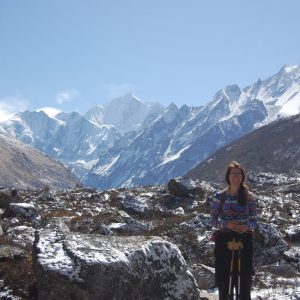On one side of a hill, lies a little village of Dalit (“Untouchables”) live. The earthquake flattened all the houses on that side of the hill. The Dalit families sleep in tents made of bamboo and tarp. The older members of that community always seem to be drunk, sitting around barefooted and chain-smoking. Their children do all the work, from carrying water from the well a mile away to harvesting rice. They often miss school to bring their little siblings or grandparents to the health post.
On the next side of the hill, lives the Brahmin (highest caste) people. Most of my school’s teachers are Brahmin and live in that community. Their homes are being reconstructed from the earthquake, and while not luxurious (one room stone house), they have electricity. They know a little English. Their male children go to the local private elementary school, which provides a much better education than the public school where I work. The parents talk to the teachers after exams to see how their students do, and they look over their childrens’ homework.
At night, the drunken ramblings of the older Dalit families can be heard in the Brahmin village. The Brahmins, who do not drink alcohol, sit on their front porch and laugh at all the drunken calls. “Our nightly entertainment! Who needs TV?”
The families from the Dalit community are often seen working at the Brahmin weddings, coming-of-age parties (called Brothamundas or Goophas), and other community events, mainly cleaning up after people eat. They are paid in leftover food from those events.
If I asked you which students were going to graduate and possibly go to college, you would probably say the Brahmin students. And statistically, they are much more likely to graduate. Only around 8% of Dalit children will graduate from 10th grade, compared to 40% of Brahmin children. But these children are breaking that statistic.
All five of them are the top of their class. The oldest Dalit boy just became a surgeon at most prestigous hospital in Nepal. His wife is also studying to become a doctor. I have the pleasure of teaching his four younger sisters. The oldest will graduate from 10th grade this year (the last year of public school) and has plans to continue studying in Kathmandu. She is preparing to take the SAT, with the help of a scholarship from the American Embassy, and hopes to go to college in the US. Her younger sisters consistantly recieve top marks on all the exams.
More importantly, those children are incredibly polite and considerate, no matter the situation. They are not allowed to get water from the much-closer Brahmin water tap, but they will always offer to help carry water for someone. When I go for a walk with them in the evening, we will often walk by the Brahmin village. The teachers living there will invite me into their homes for a cup of tea. Dalits cannot enter Brahmin homes (one boy was murdered last year for doing so in a different part of the country), so my students always try to insist I go inside to say hello while they wait outside (of course, I always decline).
I share this story not to confirm the common notion that if someone works hard enough, they can achieve anything. These students are very much defying the odds. It’s a pleasure watching them do so.



